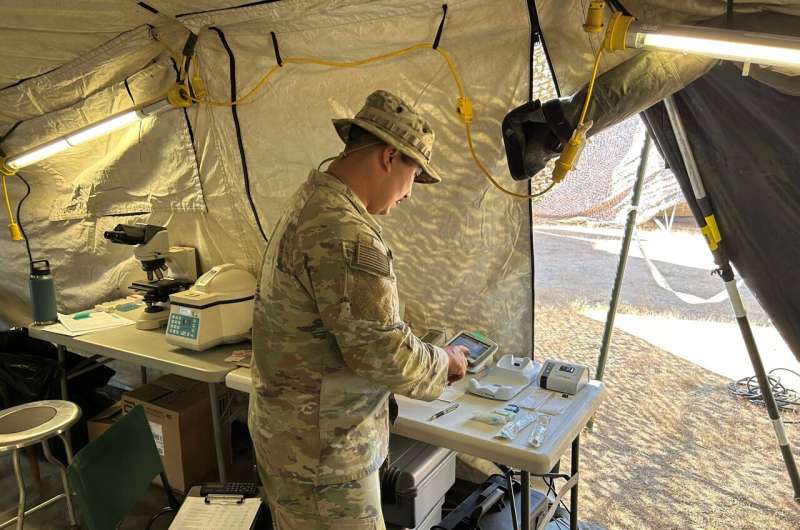This article has been reviewed according to Science X's editorial process and policies. Editors have highlighted the following attributes while ensuring the content's credibility:
fact-checked
proofread
Whole-blood rapid test to help with assessment of traumatic brain injury in military personnel receives FDA clearance

U.S. Army officials, in partnership with Abbott, announced today that the company's i-STAT TBI (Traumatic Brain Injury) cartridge has received clearance from the U.S. Food and Drug Administration to be used with whole blood.
The newly-cleared device can run whole-blood testing at the patient's bedside, allowing clinicians to obtain lab quality results for patients suspected of concussion in 15 minutes, according to company officials. Previous tests to help with the assessment of concussion were only cleared for use with plasma or serum, requiring samples to be sent to a laboratory for processing and results. In addition, patients can be evaluated up to 24 hours after injury, a significant improvement from previously available tests.
"TBIs are a major concern for warfighter health, readiness, and resiliency," said U.S. Army Brig. Gen. Edward H. Bailey, commanding general of the U.S. Army Medical Research and Development Command (USAMRDC). "This milestone accomplishment demonstrates how Army medical developers can partner with industry to deliver solutions for frontline medical personnel caring for our injured service members."
Nearly 500,000 U.S. troops worldwide experienced a TBI resulting from military training, deployment, or day-to-day activities—such as sporting events—between 2000 and 2023, according to DoD statistics. Developing a field-deployable solution for the detection and evaluation of TBIs among service members stationed at home and abroad is therefore a top priority for the U.S. military health system.
Abbott developed the i-STAT TBI blood test in collaboration with the U.S. Army Medical Materiel Development Activity (USAMMDA), part of USAMRDC. The command has been dedicated to developing a solution for detecting and evaluating TBIs for more than two decades.
U.S. Army Col. Andy Nuce, commander of USAMMDA, said the assay will enhance the ability of frontline medical staff to quickly assess service members with suspected TBIs. Since not all patients will require head CT scans, the new method will prevent unnecessary medical evacuations and improve TBI case management in the field.
"During future large-scale combat operations, enemy weapons and exposure to blast or concussive events will present challenges to frontline medical providers," said Nuce. "We are constantly working to investigate, develop, and field modern medical solutions to protect the Warfighters of 2030, 2040, and beyond."
U.S. Army Lt. Col. Bradley Dengler, Neurosurgical Consultant to the Office of the Surgeon General, called the test one of the most significant steps forward in the care of traumatic brain injury patients in the past 20 years.
"Given the large numbers of expected casualties with all severities of traumatic brain injury in future large-scale combat operations, this test can help maintain combat power far forward by helping to eliminate unnecessary evacuations," Dengler said.
"Additionally, and just as important given the limited number of neurosurgeons available in theater, ongoing research demonstrates that a future version of this test could be used to triage more severely injured patients, as the blood biomarker elevations correlate with the severity of their intracranial injuries," he commented. "This can help get the most severely injured service members to neurosurgeons faster and ultimately save lives."
About the test
A small venous blood sample is applied to the i-STAT TBI test cartridge, which is then inserted into the portable i-STAT Alinity instrument. The test measures the presence of two biomarkers that may be released into the bloodstream, indicating a possible brain injury.
Testing for these two biomarkers—ubiquitin C-terminal hydrolase L1 (UCH-L1) and glial fibrillary acidic protein (GFAP)—in the aftermath of an injury can provide clinicians with essential information about a patient's condition and can help health care providers decide on an appropriate treatment plan.




















